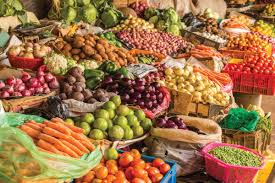Chamber of Agribusiness Calls for Sector-Wide Price Cuts and Urgent Government Support to Curb Food Crisis
The Chamber of Agribusiness Ghana is calling for immediate, collaborative price adjustments across the country’s agribusiness and agro-industrial value chain in a bid to restore food affordability, preserve economic stability, and safeguard national food security.
The Chamber is appealing to players across the agricultural value chain – from input suppliers to commodity aggregators, agro-food retailers, and food transporters – to reassess their pricing structures and reduce margins amid Ghana’s worsening food price inflation.
In a statement issued on Sunday, August 4, 2025, the Chamber warned that soaring food prices are crippling consumer purchasing power, pushing healthy diets beyond the reach of millions, and eroding gains made towards national food and nutrition security.
“Ghana’s food system faces unprecedented strain. Soaring food prices severely erode consumer purchasing power, pushing nutritious diets out of reach for millions and directly threatening our national goals of food security, improved nutrition, and balanced diets. While acknowledging the cost pressures on businesses, inaction is not an option. Collective responsibility is paramount,” the Chamber noted.
Justification for Price Reductions
The Chamber outlined five key reasons underpinning its call for nationwide price reductions:
Preventing Malnutrition and Disease
Elevated food costs are forcing many low-income households to substitute nutrient-rich foods such as fruits, vegetables, legumes, and animal protein for cheaper, calorie-dense alternatives, heightening the risk of stunting, wasting, and non-communicable diseases.Preserving Farmer Viability
The Chamber observed that without affordable inputs and fair post-farmgate margins, many farmers risk scaling down production or abandoning farming altogether. Lower farmgate prices – enabled by reduced downstream margins – are critical to keeping farmers profitable and motivated.Curbing Food Inflation and Economic Risks
With food accounting for the largest share of Ghana’s Consumer Price Index (CPI), high food inflation continues to erode wages, limit central bank policy options, and threaten macroeconomic stability.Reviving Consumer Demand
The Chamber argues that unaffordable food prices are weakening demand across non-food sectors, stalling economic recovery. Lower food costs would allow consumers to reallocate income, stimulating wider economic activity.Reducing Waste and Enhancing Efficiency
Elevated prices often obscure operational inefficiencies. The Chamber believes a coordinated push for lower prices could drive value chain players to reduce post-harvest losses, streamline logistics, and optimise cost structures.
Government Urged to Intervene Decisively
While urging private sector players to adjust their margins responsibly, the Chamber also called for sweeping government interventions to address structural bottlenecks that continue to inflate prices and discourage productivity.
Key demands include:
Input Subsidies and Resilience Measures: Implementation of transparent, targeted subsidy schemes via e-vouchers and expansion of local seed and fertilizer production to reduce import dependence.
Post-Harvest Infrastructure: Investment in community-level silos, cold storage, and affordable post-harvest technologies such as hermetic bags and solar dryers to reduce losses estimated between 30% and 50%.
Transport and Logistics Reform: Rehabilitation of feeder roads, enforcement of axle load regulations, and incentives for transitioning to rail and modern trucking systems.
Access to Affordable Finance: Expansion of credit guarantee schemes like GIRSAL, enforcement of interest rate ceilings on agribusiness loans, and streamlined credit access for SMEs.
Market Intelligence and Coordination: Establishment of mobile-accessible market information systems and promotion of structured market linkages and contract farming models.
A Shared Responsibility
The Chamber described the present crisis as a national emergency that demands dual responsibility from both the public and private sectors.
“The Chamber of Agribusiness Ghana urges its members: Act Now. Adjust your margins. Streamline operations. Innovate for efficiency. Lower prices to reflect the economic reality faced by Ghanaian consumers and farmers. This is essential to sustain demand, support production, and safeguard national health,” the Chamber emphasised.
“To the Government, we demand decisive action. The challenges outlined are not insurmountable but require political will, innovative policy, and significant, well-targeted investment. Implement the sustainable solutions demanded above. Create the enabling environment where price reductions by the private sector are feasible and impactful,” it added.
It added that only through a coordinated national approach – marked by responsible pricing and systemic reform – can Ghana unlock its agricultural potential and build a resilient, food-secure future.








